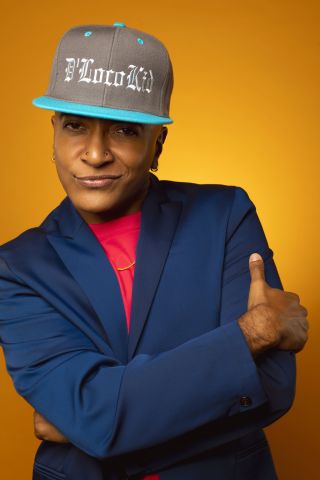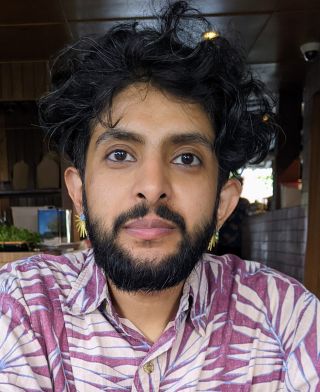Identity
On Being Brown and Trans
Interview with comedian D'Lo and psychologist Aakash Kishore, Ph.D.
Posted January 10, 2023 Reviewed by Michelle Quirk
Key points
- For members of the South Asian LGBTQ+ community, living an authentic life often requires facing unique challenges.
- It is common for South Asian parents to deny something they deem “atypical” as a phase or to simply ignore it.
- Shame has a big influence on the behavior and attitudes of the South Asian diaspora and is often a reason behind conformity.
In the South Asian (SA) community, conformity of culture, family, and gender is an unspoken principle. For members of the SA LGBTQ+ community, living an authentic life often requires facing unique challenges. While this article does not attempt to address all of the many identities and genders that a person can hold, I hope to shed light on certain aspects as I expand my own understanding of these communities.
I had the pleasure of interviewing two amazing individuals who shared their personal stories with me. D’Lo (he/they) is a queer/transgender Tamil–Sri Lankan–American actor, writer, and comic, whose work spans from stand-up comedy to the stage ("To T, or not To T") to TV ("Sensate 8," "Looking") and films (Bros). He is also a regular performer/speaker on the college/university circuit. Aakash Kishore, Ph.D. (they/he) is a queer, transmasculine, South Asian clinical psychologist who earned their doctorate from UCLA in 2015. They are deeply invested in liberation psychology and decolonizing psychology in their practice, research, and advocacy.

Coming Out
I came out to my parents three times essentially. —D’Lo
Coming out is a pivotal rite of passage for LGBTQ+ individuals. For SAs, this can be even more complicated. There is a steady path that SAs (particularly first-generation children of immigrants) are expected to tread, which includes education, career, marriage, and children. Parents’ concerns are often based on their children’s prospects in each of these areas. When something interferes with this trajectory, some parents express their fear of the unknown with feelings of shock, denial, and shame, all of which make the process of coming out extremely daunting.
In his stage show, “To T or Not to T,” D'Lo narrates through vivid and dynamic storytelling his journey about coming out as a Sri Lankan Tamil:
The first time was as gay, because although I was assigned female at birth, I didn't identify with the definition of a lesbian, and gay was a more all-encompassing word much like how queer is being used right now. Initially, they were shocked, then feeling bad for me to some degree, because it meant that I might not ever be ‘settled down,’ and then my Amma [Tamil word for mother] went to the extreme with her Hindu conversion therapy plan.
The second time I came out was more to confirm my queerness, by telling my parents that I had a girlfriend, although my parents would have preferred me to be queer and quiet about it. The third time I came out as trans, and while it was the easiest coming out, it was the hardest and longest learning curve. They had known for decades that I identified masculine, that my friends referred to me in male pronouns, that I had other transmasculine friends who had medically been transitioning, so I guess they put it all together and knew that this could possibly be a part of my journey, but they dreaded it. Now, they have chilled out, but this is also decades in the making!
Denial is a universal defense deployed when the ego cannot digest information it has received, sometimes with dire consequences to oneself or others. It is common for SA parents to deny something they deem “atypical” as a phase or to simply ignore it. Dr. Kishore shares:
I came out to my family several times over about a 5-year period. My parents responded by pretending I hadn't said anything—about my gender identity, pronouns, or affirmed name. It was an extremely damaging omission and caused me to question my own reality, my right to be treated with dignity and respect; my worth outside of a specific, ascribed role as daughter. I spent a lot of time trying to help my family understand it before realizing I wasn’t going to be able to survive that way.
I was actually outed in the community first, which is what prompted me to come out to my parents when I did.
Gossip in the SA community is a toxic fallout that is spurred on by expectation and comparison. While the “gossiping Aunty'' circuit is a well-known trope showing up in funny memes and jokes in SA media, it is sadly something far more damaging than humorous. Dr. Kishore shares:
When I was outed in my St. Louis Indian community, there was initially a lot of gossip about me and my family…It took a big toll on my mom in particular and I think made it that much harder for her to support me.
It was very obvious to me that my parents felt ashamed of how I looked and tried different ways (consciously or not) to undermine my identity and my reality.

Shame has a big influence on the behavior and attitudes of the SA diaspora and is often a reason behind conformity. Dr. Kishore relates a story at his cousin’s wedding where their mother insisted that they dress in women’s clothes, but they refused. They spoke of “slipping up” and essentially being caught between two personas during the whole event, “a young woman” to his family and a young man to the guests, with neither group realizing it.” They add, “It was almost comical, but also scary.”
Such reactions often come from traditional values and any departure from this is viewed as too Westernized. “I struggled quite a bit with my identities as South Asian and queer/trans because what I had been taught was a fairly narrow definition of cultural values”; Dr. Kishore describes how they grew up “with a very clear idea of what it meant to be a ‘good Indian girl” and I worked very hard to fit myself into that mold for the sake of my family because I had a sense that their needs, identity, and reputation in the community were more important than my own as an individual.”
D’Lo shared, “For me, personally, there's two folds to this—the cultural stigma of being queer and also that children are supposed to strive with every bone in their body to not disappoint or hurt their parents.” While this is slowly changing in some families, the backlash impacts generations of individuals to this day.
Mental Health and Family Support
I think for queer people battling internalized homophobia, transphobia, queer phobia is a lifelong journey. —D’Lo
Familial acceptance can be incredibly affirming. Dr. Kishore describes how eventually their family stopped reacting from a place of fear and shame, as well as how powerful their grandmother’s acceptance was to them. What some South Asian parents may fail to realize is how much stigma queer individuals face in their daily lives and that parental support can help combat serious mental health issues. According to research on LGBTQ+ youth by the Trevor Project in 2021, parental support by at least one parent related to lowered suicide rates compared to those with no parental support.
Dr. Kishore concurred, saying that with many LGBTQ+ people there is evidence that parental support and parental rejection do impact aspects of South Asian queer identity formation. In particular, they state, “these parental factors may predict the integration of South Asian and queer identities and whether individuals see these aspects of their identity as being harmonious or conflicted.”
Suicide is a looming issue in the LBGTQ+ community. “Maybe it's not as bad for younger people today, but for my generation it definitely was. There are people in my community who I walked with who are no longer here. Many of whom died by suicide or gradually by self-medicating or substance abuse,” shared D'Lo. “In the past, I have battled with depression, self-medicating with alcohol and weed or other means of escaping or compartmentalizing in order to just stay alive, keep working, etc.”
On a positive note, D'Lo feels that the stigma around mental health in the SA community is slowly lifting and that most queer South Asians don’t seem to have issues with seeking therapy. He states that oftentimes it's the parents who need to go, but they instead send their child to be “straightened out.”
Dr. Kishore finds that the mental health community needs to develop more understanding around the health and healing practices of diverse individuals within their cultures. “So many of the stigmas have colonial origins, but I don’t think we do enough to interrogate that, or to really understand how interfacing with a very white, Western mental health field could replicate rather than alleviate historical traumas.” They also encourage the importance of questioning our own “gendered journey” as SA clinicians as a first step toward a more-inclusive practice.
Social Support
By seeing others who are standing tall, we then believe that it is possible to live in a world even if that world is largely in the belief that we shouldn't exist. —D’Lo
Social support is one of the most vital aspects of life, especially for those who feel isolated or othered. It can be a lifeline to someone in need of empathy and understanding to feel heard and seen. Both D'Lo and Dr. Kishore share how incredibly helpful it was to connect with other queer and trans South Asians and that this has been life-saving during challenging times.
Dr. Kishore points out that there is a huge burden on trans folks to be out and visible in spaces that are not always safe or accepting. For both of these individuals, ultimately it was their uncompromising courage that made the difference. But, as allies, it's imperative that we question our own spaces to assess how gendered they are and our readiness to receive someone who may need to find community and connection.




